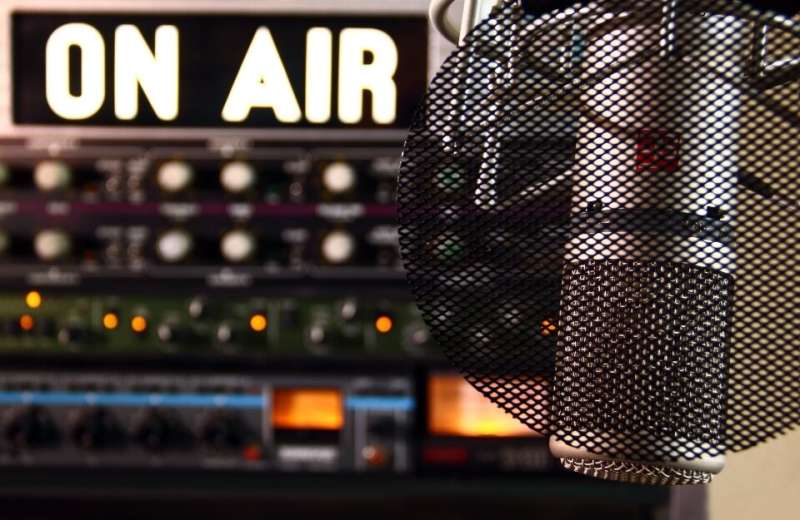Countries with well-funded public media have healthier democracies

Thousands of newspapers across the U.S. have shuttered or downsized in recent years, leaving many communities without—or with highly diminished—local news outlets. The collapse of local journalism and rise of 'news deserts," along with the spread of dis- and mis-information, all point to a news industry in crisis.
As commercial news continues experiencing structural and financial issues, media scholar Victor Pickard, Ph.D., the C. Edwin Baker Professor of Media Policy and Political Economy and Co-Director of the Media, Inequality & Change (MIC) Center at the Annenberg School for Communication, advocates for a promising alternative: increased government investment in nonprofit and public media.
Scholarship by Pickard and others finds that public media has myriad social benefits, including more diverse news coverage, increased public knowledge about politics and public affairs, and lower levels of extremist views. Building on this, a new study co-authored by Pickard and Timothy Neff, Ph.D., reveals that countries with independent and well-funded public broadcasting systems also consistently have stronger democracies.
The study, "Funding Democracy: Public Media and Democratic Health in 33 Countries," shows that while other democracies have recognized the value of public media systems, America is a major outlier. Despite having the world's largest gross domestic product (GDP), America spends a comparatively miniscule fraction—less than half of a percent—on public media funding.
As newsrooms around the country continue to dwindle, a well-informed and politically engaged public is essential for democracy to thrive. In this Q&A, Pickard and Neff, a former MIC postdoctoral fellow and now a lecturer in Journalism at the University of Leicester, explain how democratic health is determined, how the U.S. ranks against other countries, and how our media infrastructure can be changed for the better.
How did you choose which countries to analyze for this study?
TN: We selected 33 countries that spanned The Economist's Democracy Index's seven global regions. Our selection criteria favors countries ranked as either full or flawed democracies, rather than authoritarian regimes, as well as countries that enable comparisons across different types of national media systems. We correlated these countries' democratic rankings with their levels of public media funding and with regulatory structures that support their financial and political independence.
What are the factors you looked at to determine the health of a democracy?
TN: We relied on The Economist's Democracy Index, which measures health across five key dimensions of democracies: electoral process (freeness and fairness of elections); functioning of government (determination of policy by freely elected leaders, without undue influence by other powers or corruption); political participation (citizen engagement with democratic processes); political culture (public support for democracy); and civil liberties (media freedom, freedom to associate, and support for human rights).
Where is the U.S. positioned in terms of democratic health and public media funding, as compared to other countries?
VP: According to The Economist's Democracy Index, the U.S. is now considered to be a "flawed democracy." In terms of its public media funding, it is almost literally off the chart for how little it allocates towards its public media compared to other democracies around the planet. It comes out to .002 percent of Gross Domestic Product (GDP). At $465 million dollars, 2020 federal funding of U.S. public media amounted to just $1.40 per capita. Meanwhile, countries such as the UK, Norway, and Sweden spend close to $100 or more per capita toward their public media.
According to your research, how can public media help strengthen democracies?
VP: While our research specifically shows the correlation between strong public media systems and strong democracies, there is a growing body of research that suggests substantial social benefits from strong public media systems, including well-informed political cultures, high levels of support for democratic processes, and increased levels of civic engagement.
What are some arguments against government support of public media? How do you counter these criticisms?
VP: There is a common fear, especially here in the U.S., that government funding of public media creates a dangerous situation where our news organizations will become mouthpieces of the state. While state capture is a legitimate concern, many democracies around the world have figured out how to create strong safeguards to maintain public media's independence. Moreover, our research bolsters the argument that a robust public media system is beneficial—perhaps even essential—for maintaining a healthy democratic society.
What are your recommendations for the future of public media funding and infrastructure in the U.S.?
VP: Since the market is no longer supporting the level of news media—especially local journalism—that democracy requires, there is arguably now an even stronger case to make that public media needs to step into the vacuum to address the widening news gaps as the commercial newspaper industry continues to wither away. News deserts are expanding across the country and around the world. This should be public media's moment—an opportunity to revisit its core purpose and assess how it should operate within a democratic society and within an increasingly digital media system. Ideally, we would both restructure and democratize our public media system as we expand this critical infrastructure.
More information: Timothy Neff et al, Funding Democracy: Public Media and Democratic Health in 33 Countries, The International Journal of Press/Politics (2021). DOI: 10.1177/19401612211060255
Provided by University of Pennsylvania




















